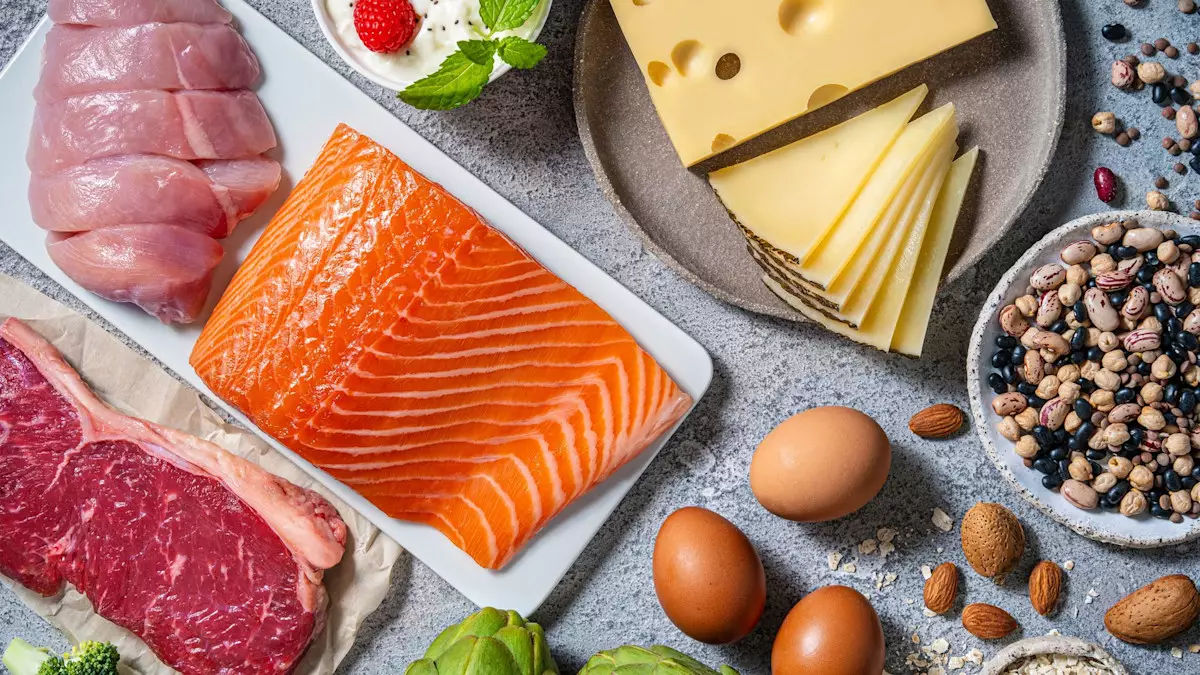When we think about protein, images of athletes sipping protein shakes or bodybuilders meticulously planning their diets often come to mind. However, this crucial macronutrient is not just a diet staple for fitness enthusiasts; it is a fundamental building block that every individual needs daily. From the vibrant glow of our skin to the strength of our muscles and even the stability of our hormones and immune system, protein plays an indispensable role in our overall health. Surprisingly, many individuals, particularly women balancing hectic schedules, may find themselves falling short on their protein intake, leading to a cascade of potential health issues.
Imagine waking up consistently feeling drained, battling persistent snack cravings, or observing unsettling changes in your physical appearance and mood. These symptoms may not solely be attributed to a busy lifestyle or natural aging; they might indicate a subtle yet detrimental protein deficiency lurking beneath the surface. While we often ignore our body’s signals, becoming attuned to these cues is paramount, particularly in understanding our nutritional needs.
Cravings and Energy Levels: The Protein Connection
A frequent complaint many face is the all-too-common scenario of finishing a meal only to feel ravenous again an hour later. This feeling is not just a matter of willpower; rather, it’s a symptom that highlights how vital protein is in regulating our appetite. Protein helps signal to our body that it’s full by promoting the release of hormones that keep hunger at bay. Meals deficient in protein can leave us on a roller coaster of energy levels, leading to excessive snacking on quick-fix carbohydrates and sugary treats.
Incorporating high-protein foods such as eggs, beans, lean meats, and yogurt into our meals can create a buffer against these energy dips. It not only aids in curbing cravings but also supports sustainable energy levels throughout our day-to-day activities.
The Muscle Myth: Beyond Aesthetics
Contrary to popular belief, muscle maintenance goes beyond mere aesthetics; it has profound implications for our metabolic health, balance, and daily functioning. If our protein intake wanes, our bodies may resort to breaking down muscle tissue for energy, particularly concerning if one is concurrently losing weight. Over time, this depletion can lead to muscle weakness, diminished stamina, and a notable loss of tone.
For women over 40, the stakes are even higher. Preserving muscle mass becomes crucial for maintaining long-term health and preventing injuries. Regular protein consumption, coupled with strength training, can safeguard lean tissue and equip us with the strength necessary to navigate life’s challenges.
Your Look Speaks Volumes
The signs of protein deficiency are often visual, manifesting in the health of our hair, skin, and nails. If you notice thinning hair, lackluster skin, or brittle nails, protein may be the missing link in your nutrition. Proteins like keratin, collagen, and elastin are essential for maintaining the integrity of these structures; insufficient levels can result in noticeable changes that many misinterpret as simple signs of aging or stress.
Many clients are astonished to learn that dull skin or sudden hair loss can often be rectified by enhancing their dietary protein intake. By focusing on nutrition, we can combat these alarming changes and reclaim our vibrant selves.
Fueling the Immune System
Protein is often recognized for its contribution to muscle repair, yet its role extends well beyond that. It is critical in building antibodies and immune cells that defend against pathogens. A low protein intake can weaken the immune response, making one more susceptible to illnesses. Prolonged recovery from common colds or unexpected extended healing times for minor injuries may indicate an essential protein deficit.
Healing requires a sufficient protein supply; without it, the recovery process can lag, impeding our ability to bounce back from illness or injury effectively. Ensuring our diets are rich in high-quality protein is vital, especially in the wake of surgeries or rigorous physical activity.
A Deeper Dive Into Mental Health
The influence of protein transcends physical health—it also encapsulates our emotional and mental wellbeing. Proteins are a precursor to neurotransmitters such as dopamine and serotonin, key players in regulating mood, focus, and sleep quality. A protein deficiency may lead to mood swings, decreased motivation, or even symptoms of anxiety that can subtly creep in.
Tuning into our body’s dietary needs can illuminate the reasons behind persistent emotional challenges. When cravings for protein-rich foods arise, they may not simply be about hunger; they can be a cry for balance and nourishment.
Reassessing Your Plate
While the general recommendation suggests a consumption of 0.8 grams of protein per kilogram of body weight, many individuals, particularly women, may thrive on higher amounts, especially during periods of pregnancy, breastfeeding, or after physical exertion. Targeting 20 to 30 grams of protein per meal can be beneficial.
Great protein sources include eggs, fish, poultry, legumes, and Greek yogurt. Diversifying protein sources while pairing them with colorful veggies and healthy fats ensures that meals are not just filling but also nourishing.
In the end, if subtle changes in your energy levels, mood, or appearance unsettle you, it’s time to reconsider your dietary focus. Protein is far more than just a nutrient; it is an integral part of our holistic health and wellbeing. Embrace the power of a balanced meal, and recognize that each bite is a step toward feeling your best.


Leave a Reply